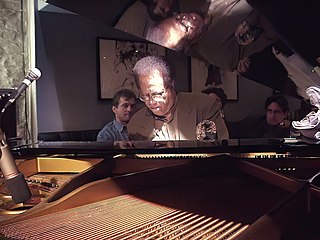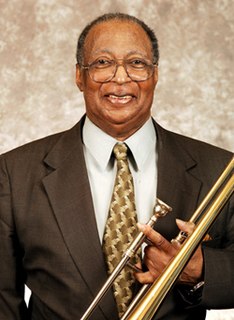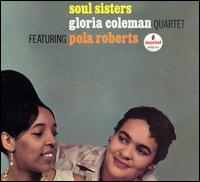Related Research Articles

Cedar Anthony Walton, Jr. was an American hard bop jazz pianist. He came to prominence as a member of drummer Art Blakey's band, The Jazz Messengers, before establishing a long career as a bandleader and composer. Several of his compositions have become jazz standards, including "Mosaic", "Bolivia", "Holy Land", "Mode for Joe" and "Fantasy in D".

Stanley William Turrentine was an American jazz tenor saxophonist. He began his career playing R&B for Earl Bostic and later soul jazz recording for the Blue Note label from 1960, touched on jazz fusion during a stint on CTI in the 1970s. He was described by critic Steve Huey as "renowned for his distinctively thick, rippling tone [and] earthy grounding in the blues." In the 1960s Turrentine was married to organist Shirley Scott, with whom he frequently recorded, and he was the younger brother of trumpeter Tommy Turrentine.

James "Blood" Ulmer is an American jazz, free funk and blues guitarist and singer. Ulmer plays a Gibson Byrdland guitar. His guitar sound has been described as "jagged" and "stinging". His singing has been called "raggedly soulful".

Kenneth Earl Burrell is an American jazz guitarist known for his work on the Blue Note label, as well as numerous other top jazz labels such as Prestige, Argo, Verve, Cadet, CTI, Muse, and Concord. His collaborations with Jimmy Smith were notable, and produced the 1965 Billboard Top Twenty hit Verve album Organ Grinder Swing. He has cited jazz guitarists Charlie Christian, Oscar Moore, and Django Reinhardt as influences, along with blues guitarists T-Bone Walker and Muddy Waters.

Al McKibbon was an American jazz double bassist, known for his work in bop, hard bop, and Latin jazz.

Reginald "Reggie" Workman is an American avant-garde jazz and hard bop double bassist, recognized for his work with both John Coltrane and Art Blakey.

George Edward Coleman is an American jazz saxophonist known for his work with Miles Davis and Herbie Hancock in the 1960s. In 2015, he was named an NEA Jazz Master.

Curtis DuBois Fuller was an American jazz trombonist. He was a member of Art Blakey's Jazz Messengers and contributed to many classic jazz recordings.

Lonnie Plaxico is an American jazz double bassist.
Julius Watkins was an American jazz musician who played French horn. Described by Allmusic as "virtually the father of the jazz French horn", Watkins won the Down Beat critics poll in 1960 and 1961 for Miscellaneous Instrument.

Shirley Scott was an American jazz organist.

George Duvivier was an American jazz double-bassist.

Birdland is a jazz club started in New York City on December 15, 1949. The original Birdland, which was located at 1678 Broadway, just north of West 52nd Street in Manhattan, was closed in 1965 due to increased rents, but it re-opened for one night in 1979. A revival began in 1986 with the opening of the second nightclub by the same name that is now located in Manhattan's Theater District, not far from the original nightclub's location. The current location is in the same building as the previous headquarters of The New York Observer.
James Milton Cleveland was an American jazz trombonist born in Wartrace, Tennessee.
Gloria Coleman was an American musician.
Leon Lee Dorsey is an American jazz bassist, composer, arranger, producer, and educator known for his well-received debut for Landmark Records. He teaches at the Berklee School of Music in Boston.
In the late 1960s, Latin jazz, combining rhythms from African and Latin American countries, often played on instruments such as conga, timbale, güiro, and claves, with jazz and classical harmonies played on typical jazz instruments broke through. There are two main varieties: Afro-Cuban jazz was played in the US right after the bebop period, while Brazilian jazz became more popular in the 1960s. Afro-Cuban jazz began as a movement in the mid-1950s as bebop musicians such as Dizzy Gillespie and Billy Taylor started Afro-Cuban bands influenced by such Cuban and Puerto Rican musicians as Xavier Cugat, Tito Puente, and Arturo Sandoval. Brazilian jazz such as bossa nova is derived from samba, with influences from jazz and other 20th-century classical and popular music styles. Bossa is generally moderately paced, with melodies sung in Portuguese or English. The style was pioneered by Brazilians João Gilberto and Antônio Carlos Jobim. The related term jazz-samba describes an adaptation of bossa nova compositions to the jazz idiom by American performers such as Stan Getz and Charlie Byrd.

Soul Sisters is an album by American jazz organist Gloria Coleman featuring Pola Roberts recorded in 1963 for the Impulse! label.

The Jazz Messengers were a jazz combo that existed for over thirty-five years beginning in the early 1950s as a collective, and ending when long-time leader and founding drummer Art Blakey died in 1990. Blakey led or co-led the group from the outset. "Art Blakey" and "Jazz Messengers" became synonymous over the years, though Blakey did lead non-Messenger recording sessions and played as a sideman for other groups throughout his career.
"Yes sir, I'm gonna to stay with the youngsters. When these get too old, I'm gonna get some younger ones. Keeps the mind active."
The Jazz Messengers were a jazz band that existed with varying personnel for 35 years. Their discography consists of 47 studio albums, 21 live albums, 2 soundtracks, 6 compilations, and one boxed set.
References
- Pittsburgh Jazz (2007, John M. Brewer Jr., ISBN 9780738549804)
- The House That Trane Built: The Story of Impulse Records (2007, Ashley Kahn, ISBN 9780393330717)